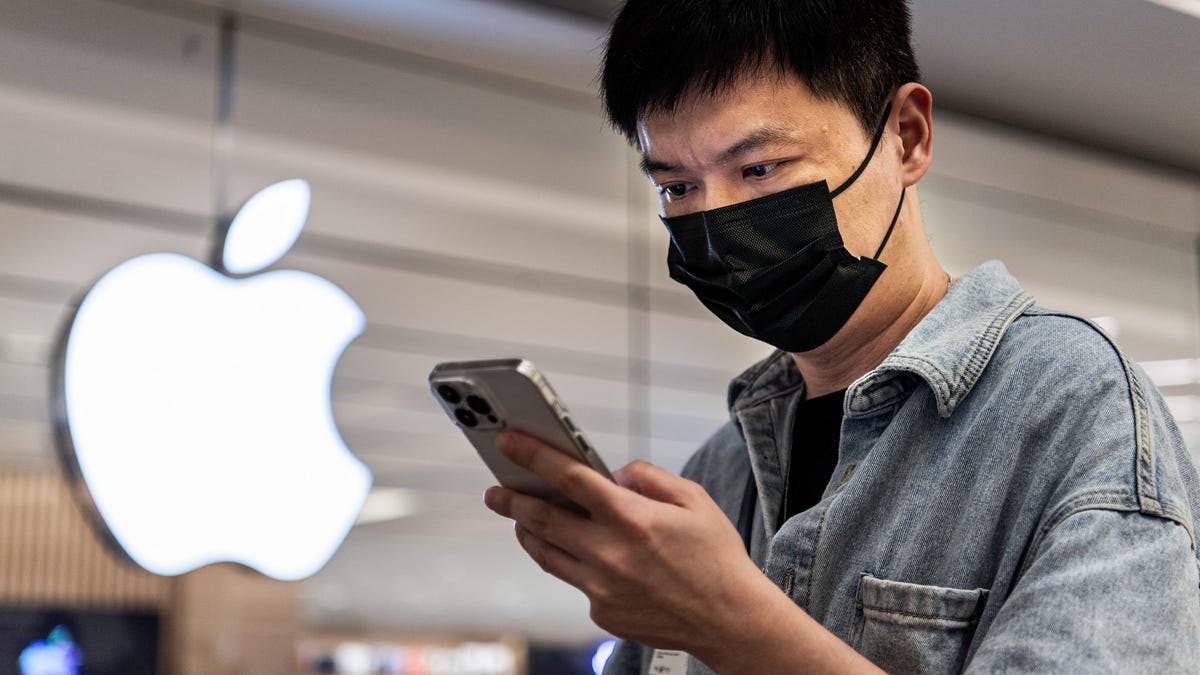iPhone 14 Will Be the Only Bright Spot in a Bummer Holiday-Shopping Season

Apple sells lots of iPhones during the holiday season, but inflation and supply issues could make consumers cautious about big-ticket purchases.
SOPA Images / Getty Images
This story is part of Focal Point iPhone 2022, CNET’s collection of news, tips and advice around Apple’s most popular product.
This holiday season, Santa Claus is making a list and checking it twice. But will he include Apple’s iPhone 14 in this economy??
Apple’s iPhone 14 launch event this week will serve as the unofficial kickoff for the holiday shopping season. As usual, the phones are expected to start at $700 and go past $1,000, making them expensive even in the best of circumstances.
But this holiday season will be far from the best circumstances, as experts predict consumer spending to be notably lower than last year. People are expected to lower their budgets as persistent inflation drops purchasing power and the specter of a recession is pushing companies to enact price hikes and lay off staff.
See also:?How to Watch Apple’s ‘Far Out’ Sept. 7 Event
iPhones historically have good sales, but it’s an exception and not a guarantee. The reality is that the economic situation makes it hard to guess whether consumers will embrace Apple’s phones, and while there’s enthusiasm among some people for the device, it’s unclear whether that can overcome the dour feelings everyone seems to have.?
Consumers are already saving however they can on essentials by buying no-name brands, so this holiday season they’ll probably be a lot more selective when it comes to big-ticket items, said Angelica Gianchandani, professor of marketing at University of New Haven’s Pompea College of Business.
“[Consumers are] going to pick for the value, and they’re really going to look to the retailers for sales and discounts and promotions,” Gianchandani said.?
The good news is that some parts of the market may bounce back in 2023. A new report from market researcher IDC expects this year’s smartphone shipments to have declined 6.5% compared with last year thanks to global economic conditions before the phone industry rebounds to 5.2% predicted growth in 2023.?
Things will get worse before they get better.
Down in the dumps
A lot of people are seeing red when they look at where the economy’s headed over the next few months, and that’s not just the holiday decorations. Consumer confidence is slowly recovering from its lowest point in nearly a decade back in July, according to the Conference Board. The Fed is making unprecedented moves,?raising interest rates to lower inflation, which could cool consumer spending.?
The tech industry, in turn, has started feeling the aftershocks of inflation and turmoil — Facebook parent company Meta admitted that shrinking ad sales led to its first-ever revenue drop, Google ad sales were similarly down, and Snap just announced it was laying off one in five of its employees in a companywide restructuring.
Apple so far seems to be powering through. The company fared better than its tech peers, as CEO Tim Cook explained during an earnings call in July that even though iPhones were the last to the 5G game, connectivity to the next-gen networks is a catalyst for growth.
Apple’s ability to actually get its iPhones into people’s hands is a feat in and of itself these days, analysts say, thanks to supply chain shortages and COVID lockdowns in China, which have disrupted manufacturing for everything from cars to phones to garlic. But Apple says it’s been able to largely work beyond those issues, with Cook reporting sales growth in nearly every region during last quarter’s earnings call. The company expects to sell just as many iPhones this holiday season as it did last year, given how many iPhone 14 units it ordered, Wedbush analysts said, pointing out that around a quarter of the 1 billion iPhones actively used are 3.5 years old or older and likely ripe for an upgrade.
So even though we aren’t expecting many improvements in the iPhone 14 over last year’s model, it’ll be far more advanced than the 3-year-old iPhone 11. All of Apple’s other services and accessories like Apple Watches that require iPhones mean it’s probably a question of when, not if, they’ll upgrade.?
“I don’t think there’s a single feature that makes you buy a phone. More and more it’s the package you get,” said Carolina Milanesi, analyst at Creative Strategies.
Some early pandemic issues, like supply chain shortages, have cleared up, though not for everything — ask anyone who’s still trying to buy a PS5. But we’re spending differently now, too, as the online ordering sprees that started at the beginning of the pandemic have finally tapered off. This year, inflation rose to seriously impact spending on smartphones and other market segments. PC and tablet sales may continue to slump into 2023, IDC predicted.
Along with Apple, other premium brands selling pricey products like Lululemon may still be selling better than everything else, but it isn’t clear which big-ticket items will make it into consumers’ spending budgets. Experts expect people will simply buy less this holiday season, and we’ll get a better idea how they’ll be spending — and what they’ll be spending on — once we’ve tallied up September’s spending totals on back-to-school items and Labor Day escapes, which serve as a bellwether for the holiday season.
Consumers could simply wait for more discounts that drop earlier every year ahead of the Black Friday and Cyber Monday deals seasons. Or they may buy refurbished instead of new, which dovetails with the growing consumer desire to buy more sustainable products.
“People are just being very careful of what they choose. They want to make sure there’s meaning to how they spend their money and time,” Gianchandani said.